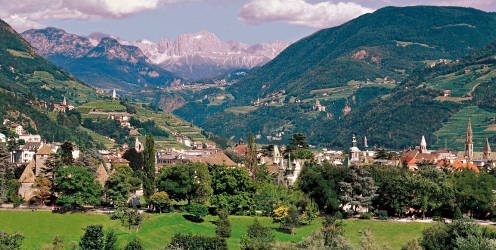
June, 20-24, 2011

| Last update: 15/6/2011 |
The Applied Bayesian Statistics summer school has been organised since 2004 by
The 2011 School will be organised, like in 2010, in cooperation with the European Academy Bozen/Bolzano (EURAC), through the Institute of Genetic Medicine. IMATI acknowledges the support by the Information and Communication Technology (ICT) Department of the National Research Council (CNR).The school aims to present state-of-the-art Bayesian applications, inviting leading experts in their field. Each year a different topic is chosen. Past editions were devoted to Gene Expression Genomics, Decision Modelling in Health Care, Spatial Data in Environmental and Health Sciences, Bayesian Methods and Econometrics, Bayesian Decision Problems in Biostatistics and Clinical Trials, Bayesian Methodology for Clustering, Classification and Categorical Data Analysis and Bayesian Machine Learning with Biomedical Applications.
The topic chosen for the 2011 school is
Hierarchical Modeling for Environmental Processes.
The lecturer will be
Alan Gelfand, J.B. Duke
Professor of Statistics and Decision Sciences, Department of Statistical
Science, Duke University, Durham, NC, USA
He will be assisted by
Raffaele Argiento (CNR IMATI, Italy) and Jacopo Soriano (Politecnico di Milano).
This course is intended to expose the value of hierarchical modeling within a Bayesian framework for investigating a range of problems in environmental science. In particular, we focus on stochastic modeling for such problems driven by the general hierarchical perspective, [data | process, parameters][process | parameters][parameters]. This specification is richer than it may appear, as the course will demonstrate. More importantly, it allows the model development to focus on the environmental process of interest, integrating the sources of information that are available. Primary problems of interest include assessment of environmental exposure, fusion of environmental data from different sources, and assessing environmental change and its potential impact on ecological processes.
The course will have a practical orientation, emphasizing model development, computation and inference driven by real examples. The course will begin with a brief review of Bayesian inference, hierarchical modeling and Bayesian computation. Then, since most environmental processes (including all of the ones we consider) are observed over space and over time, we present foundational material on spatial and space-time analysis including material on modeling for point referenced data, areal unit data, and point pattern data. We will also discuss multivariate processes, space-time processes, and computation for large datasets. Real examples will include (i) exposure assessment for particulate matter and ozone, (ii) data fusion using monitoring station data and computer model output for ozone, particulate matter and wet deposition of sulfates and nitrates, (iii) inference regarding environmental extremes illustrated through temperature data, (iv) relating environmental factors to species distributions and climate change to plant performance, (v) distributed lags in space-time regression with application to ozone formation. Sessions devoted to implementing model fitting and inference using Markov chain Monte Carlo methods will supplement the lectures and code for illustrative examples will be provided.
The school will make use of lectures, practical sessions, software demonstrations, informal discussion sessions and presentations of research projects by school participants. The slides and background reading material will be distributed to the students before the start of the course.
The prerequisites for this course will include basic knowledge of linear algebra, statistical inference, linear regression models, and data analysis. This course will be beneficial to graduate students, post-docs and researchers both from academia, government, and industry whose area of activity is Statistics, Environmental Science, Ecology, Climatology, Mathematics, Actuarial Science, Computer Science, and Engineering. Some knowledge of Bayesian Statistics is desirable, but not required. Prospective students may refer to the book Bayesian Data Analysis, 2nd Ed. by Andrew Gelman, John B. Carlin, Hal S. Stern and Donald B. Rubin (Chapman Hall, CRC Texts in Statistical Science Series, 2004). Also, the book by S. Banerjee, B.P. Carlin and A.E. Gelfand, 2004. Hierarchical Modeling and Analysis for Spatial Data, Chapman Hall, Boca Raton, as it provides foundational material for the course.
The 2011 school will be held at European Academy (EURAC), located in the city of Bolzano (Bozen in German), in the Italian Alps, not far from the Austrian border and the Dolomites.
Please note that the number of available places is limited.
The school will start on Monday, June, 20th, at 14.00 and it will
end on Friday, June, 24th, at 13.00. Wednesday afternoon (June, 22th) is free.
Welcome buffet and farewell dinner are planned on June, 20th and 23th,
respectively.
The regular registration fees (for payments between 1/3 and 30/4) are: